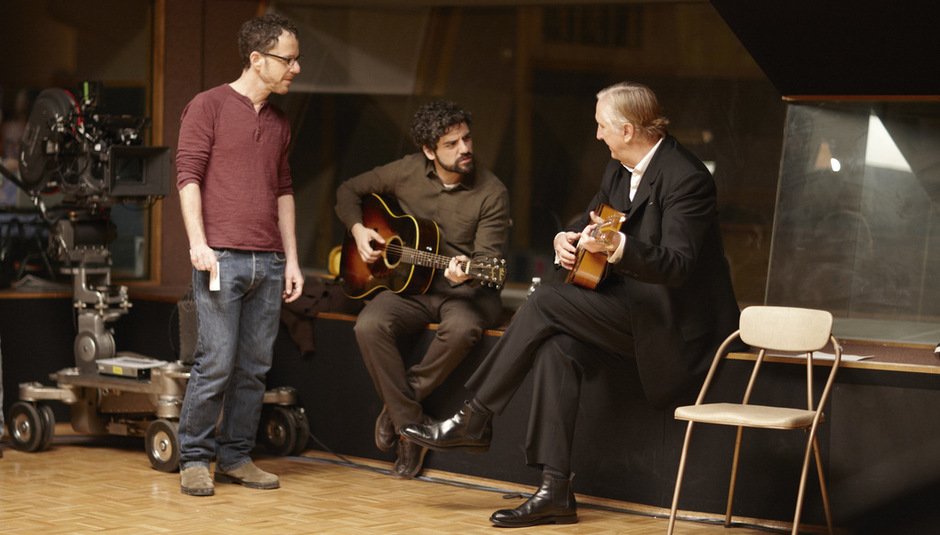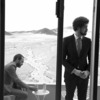T Bone Burnett is the kind of legend who makes other ‘legends’ look like frauds. Starting out as a touring guitarist on Bob Dylan’s Rolling Thunder Revue, Burnett embarked on a solo career in 1980 with the release of Truth Decay, before going on to produce records for everyone from Roy Orbison to k.d.lang. More recently he’s become known for his work on film soundtracks. His work on Cold Mountain was nominated for an Academy Award and won a BAFTA. His first collaboration with the Coen Brothers was as archivist on The Big Lebowski in 1998, before going on to soundtrack O Brother, Where Art Thou and kicking off a long-standing relationship, culminating in this week’s release of Inside Llewyn Davis.
T Bone Burnett is also, frankly, as much of a total dude as you could possibly hope to meet, an endlessly fascinating person with eloquent opinions on just about everything. So when DiS was invited to a round-table interview to talk about Inside Llewyn Davis we jumped at the chance. Naturally, the conversation quickly turned to the entire history of American grassroots music, the concept of iPhones as Darth Vader’s tracking device and, er, some incense that fixed up my nascent cold a right treat...
This isn’t the first time you’ve collaborated with the Coens. I was wondering what it is about their cinematic style and approach to film-making that suits your sensibilities so well as a songwriter and producer?
Well we both work the same way, which is... in the studio, we don’t… if there’s a guitar part, we don’t put the person’s name above the guitar part that plays, say, acoustic guitar. Because I’ve never wanted people to feel they have to take possession of any piece of it. The beautiful thing about— well, all art comes out of [collaboration], all art comes out of community. And when communities can get together and not fight over who gets what piece, but can instead say “This is ours, what we’re doing, and let’s make it great”, it just ends up being better… because as soon as someone says “well this is mine,” then it all starts fragmenting and fracturing. So to get the spirit of a piece of art right, everybody has to be absolutely generous. I try to do that, and I try to leave nothing in the bag when I’m working, and I try to set up an environment so that other people will feel comfortable doing that as well. And that’s what [the Coen Brothers] do.
Years ago, 20 years ago, I asked Joel, I think, there was a line I wondered which of them wrote. And I said “Which of you wrote this particular line?” And he said “God, you know, I don’t have any idea!” And I thought at the time, “he knows who wrote that line!” [laughs] But after having worked with them for all this time, I don’t know who wrote any of the lines, I don’t know who came up with any of the songs… That’s the beautiful thing, they work that same way. Everyone comes in, puts everything on the table. Every actor knows that this movie’s going to be seen for a hundred years, so he’s not going to leave anything in the bag either, right? Everybody just wants to come in and do their absolute best work. So... both of us, all three of us have the philosophy of setting up the environment for people to do their best work, give them the foundation to do that and then get out of the way, and give them the support they need if they need it. But they never tell anybody anything to do… they never say “Well read the line this way”. Or they might say “Do one like you’re hungover this time”, so there might be some adjustment like that, but not even much of that.
So I think that’s it really, that the idea of leaving room for— leaving freedom for intellectual thought to run wild, something like that.
That’s quite a refreshing way to kind of work, especially within music, and the film industry, a lot it seems to be about ego…
God, it’s just, you know, and it’s pathetic! It happened when they came up with this idea of the creative executive. To create and to execute are completely opposite. The notion that there’s going to be someone who’s creatively going to execute something is ridiculous on its surface! But that’s, you know… we have no creative executives!
This is definitely the most musical film the Coens have made, and that’s definitely your forte. Did you find that you had more of a say when making it?
Yeah, it’s… it always feels completely open. Working with them, I’ve always felt I’ve had… they’ve wanted me to say whatever it is I have to say. That’s what they want from you, it’s not like you have to make a case or anything.
With the films you’ve worked on, you’ve managed to highlight areas of classic American music that maybe wouldn’t have impacted on mainstream popular culture like they have in the films. Is that satisfying to know that you’re able to showcase this musical lineage to a mainstream audience?
It is. First of all, it’s a mission, something of a mission for me, because… music is to the United States as wine is to France, it’s an important part of our national identity, it's probably the core part of our national identity. We’ve defined ourselves through music, since there’s been… since it’s a country that came together behind this notion ‘one out of many’. This notion that different languages, different peoples, whether they come from the north, the west, the south, the east, where we’re all gonna—
At this point the PR interrupts us, handing Burnett a small piece of incense wood which Burnett proceeds to burn. We’re in a hotel. At 11am on a Saturday. And I have a cold. This has the potential to go very wrong.
I burn this stuff because it makes me happy. And it will you too, it’s real relaxing. Palo santo wood - we’ll get back to [the question]!
It’s wood from Peru, and it dies and it lays on the ground for a decade, and it goes through a chemical change. And they use it for allergies and headaches, it’s a medicine, a sort of root medicine.
It smells incredible!
It actually works! I’ve seen, I’ve seen — I use it in the studio, musicians all want it because it ties all of the senses together, it’s part of the community, you know, everybody smelling the same thing. Scent is such a powerful, [underrated] sense. So tied to our memory, it’s a wild thing.
Anyway, where were we?
Showcasing musical lineage...
Oh! Yeah, I was saying that this is such an important — oh! I was saying that the people came from the east, and north and south to the United States, and west, and with many different languages, and many different histories, and many different stories, and music became the common language, and then our story was told through the music. So from the Star Spangled Banner, and the revolutionary war, and I wish they would’ve left out the bombs bursting in air. Like that one decision, right there, says a lot about the United States. We’ve gotta be bursting bombs in air all the time, what is up with us?! Why don’t we let up with this bomb bursting in air!
But it’s so tied [up]. You know the civil war, and John Brown’s body, and the battle hymn of the Republic, and the civil rights movement of the 1960s-- I mean, all the civil rights movements of the 20th century, starting with the reality that the poorest people of the United States were recorded. This was the greatest act of democratisation, I say, in history, when the American Recording Industry went down south, to places where there was not electricity, and recorded the poorest people in our country, and broadcast their voices and their stories all around the world. That’s what the United States is supposed to be about, that’s the truth of it. The Internet is us attempting a mechanisation of that. Which I think is failing horribly, I’m sad to say… because I think it really comes from community. I think the actual thing, that we’re trying to mechanise, actually needs humans. I’m worried about this! [laughs] So yeah… this thing is such an important thing of our identity. And there definitely is a movement, a counter-movement, to erase it all, erase our history.
I was studying Dr Zhivago the other day, because that’s probably the greatest— one of the greatest uses of music in a film ever. The song 'Lara’s Theme', and the way they’ll play it, and then they’ll play these couple of intervals from it… they lead you through the story by telling you, giving you parts of the song, until they get to the part where they want it to pay off, and then they play the song again, so it becomes this critical part of the storytelling, and integral part of the storytelling. But the thing that struck me as I was watching it is how closely, when they were talking about Russia, how closely, how much it sounded like where I’m living right now. How they’ve done away with the individual, a person’s only value is his value to the state, the hive mind, you know, the wisdom of the proletariat will… whatever the hell it was, it was just, I can’t even remember it all! But it was all like this totalitarian state they were describing! And I realised, “Oh, I’m in a worse place than that! This is pretty wild!”
When I was a kid, I had a recurring nightmare from the time I was 5 to I was 15. These people - stormtroopers, dressed all in black, looking kind of like Darth Vader really, like, sort of in helmets and black - came into our church, and lined us all up around the parish hall, and would start cutting each person’s right hand off, and replacing it with a new hand that would be their memory and their guide and their communication system, and it was this amazing new thing. And it was a nightmare, I’d wake up from it every night in a cold sweat that they were doing this. And then the other day, I picked up my iPhone, and I realised “Oh, they didn’t have to cut off our hands! [laughs] They just put ‘em in our hands!” But this is what they’re doing, we’re living in a surveillance state. This beautiful communication system that we developed, that was supposed to be all this creative destruction, and create all this— destroy all these old archaic structures. A lot of ‘em need to be destroyed, to be sure. It’s a funny thing, my empathies are so with the anarchists [laughs] on one hand! But on the other hand, I have this real sense of, that there’s this deep history, that we have to— it’s the only way we remember who we are.
So… I forget where the question was coming from [laughs] but yes, [the promotion of musical lineage] — it’s a privilege, and it’s important to me, it’s something I take very seriously.
Talking about the kind of creative destruction of technology, as someone who’s been in the music business for such a long time, do you see it having a detrimental effect?
Oh, definitely. In the area of sound, just— if we look only at the area of sound quality, which is just a sense of real importance. Sound is a really [underrated] sense. Something like 90% of our conscious mind is... I’m trying to remember the right way to put this— we use 90% of our processing— we use 90% of our intelligence, I guess, to process visual information. All the other information enters us subliminally, more unconsciously. But that doesn’t make them any less important; in many ways it makes them more important.
But certainly in the area of sound reproduction, digital has taken us backward. I have empirical evidence that I can show, now I’ve got the whole Capitol Records catalogue, and I can go in and I can follow, and we could sit down and do it. And I will—one of these days I will come over and play this stuff for you, because I want to go around and do it. You can follow the degeneration of sound over the last 60 years, to the point where— we’re at a point now where there are no standards, there are no sound standards. MP3 was never intended as a standard for audio sound… it’s a relic of the dial-up modem. The reality is, I’m working at USC, and we’re working in 5G and holograms and telepresence, and everything is fast and clear and high definition and it sounds great and everything works. And you get on what we call the Internet, and it’s all creaky. It’s a really creaky, bad, 20th century technology that needs to be discarded.
My view is that there are two 20th century technologies that if the human being is going to make it out of this century... there are two technologies that we’re going to have to upgrade immediately, and one is the internal combustion engine, and one is our communications system. They’re both destroying us. They’re destroying us because we’re having slave labour, all around the world, make all this stuff for us.
You know, in the United States, we outlawed slavery in 1860. But we’re employing— not employing, we’re using more slaves now than we were in 1860, to manufacture our shirts, in these sweatshops, and all this stuff. So we’re gonna have to get real about why we’re lying to ourselves about what we’re doing. That’s where this local— that’s the other side of this that we’re talking about, the local region, the two megatrends, the trend towards regionalism and the trend towards globalism, right? So we can’t lose our regional identity as we move into globalism, and certainly our communication system is trying to move us into globalism at warp speed, without allowing us to really make decisions, important decisions, that need to be made.
Like, the World Wide 3 Consortium, the W-3-C, the WWW consortium, allowed anonymous comments, in the most non-anonymous forum in the history of the world. It was just a flat-out lie! It was a bait and switch. They allowed everybody to go on, and state their true opinions under pseudonyms, but they built incredible dossiers on everybody now. This is all recorded, they’ve got all— people have done all kinds of things that they wouldn’t do in normal life, they’ve said all kinds of things to other people they wouldn’t say in person. And not just a little bit of it, but they’ve got libraries and libraries and libraries. They’re building huge warehouses out in Wyoming and Montana just to house the data they’re collecting on everybody. And it’s not just the Government, it’s every cooperation. It’s not the evil government, it’s just the way… decisions, unethical… there’s been an unethical social system put into place, and it’s doing the exact opposite of what they said it was going to do. They said it was going to level the playing field, and democratise everything, but instead it’s consolidated power into fewer and fewer hands. So you know, there’s a lot of work to do.
We could go for another hour or so!
I know we’re just getting started! There’s so much to talk about!
And now about the movie!
[laughs]
This is all about the movie! You all know, you understand.
[general agreement]
The good thing is, the shift is taking place. The shiny object was up there, and everybody went for it, and now everybody’s going “well, what the fuck?!” This Edward Snowden thing? It’s probably the best thing that’s happened. And not that I recommend that, you know what I mean? Because I think it’s a bad thing in some ways. But we’ve gotta face who we are, or we’re just gonna kill ourselves. We’ve gotta be real about who we are. You know when George [W.] Bush said they attacked the United States, the World Trade Center because of our freedom, he was half-right. They attacked us because of their servitude, and the freedom we flaunt in the face of it. But Richard Rainwater, who’s one of the smartest macro thinkers I know, told me that if we paid all the slave labour that's making the oil for us a dollar a day, we’d be paying $200 a gallon for gas. I don’t know in petrol and pounds, but $3 to $200, that’s a lot of freedom!
Inside Llewyn Davis is on general release in cinemas from Friday 24th January 2014.
[94265]: http://dis.resized.images.s3.amazonaws.com/540x310/94265.jpeg






















